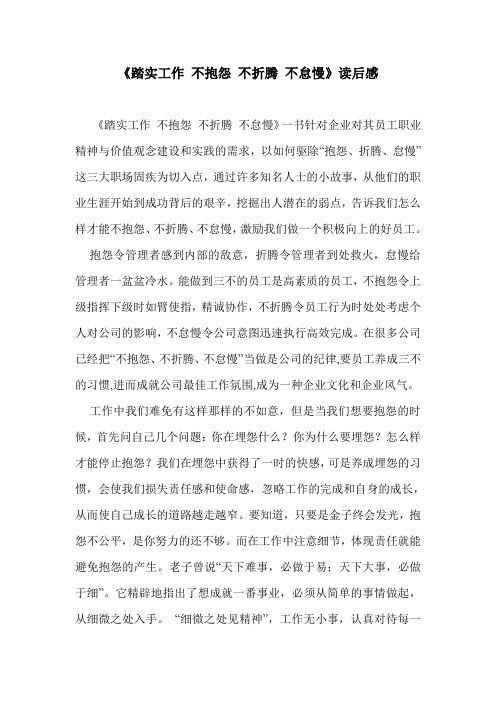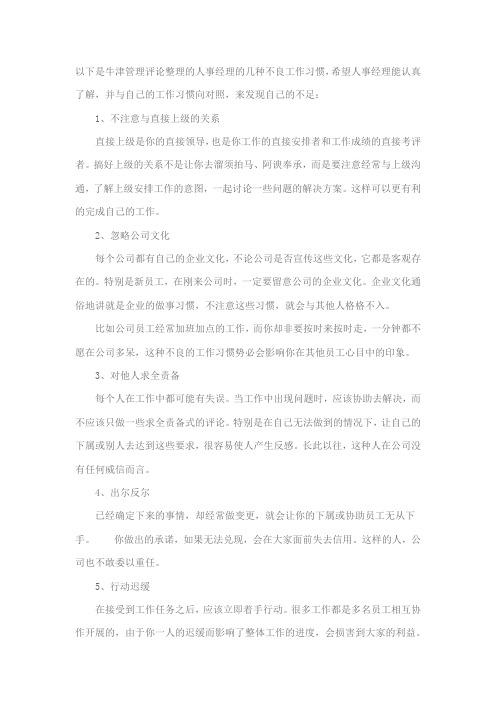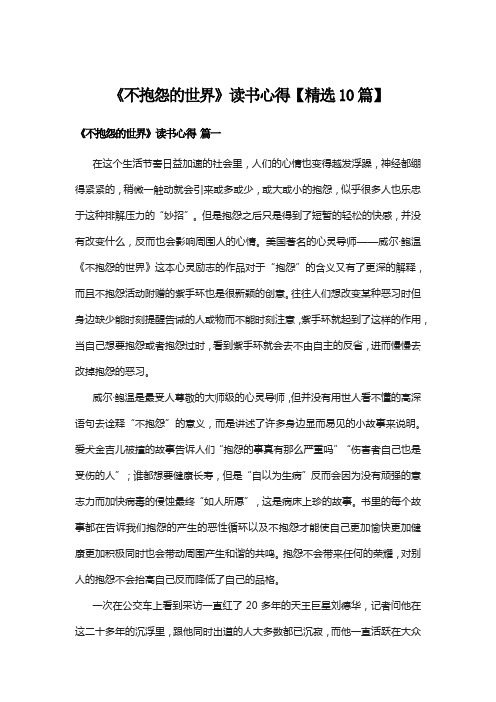(整理)对待抱怨的同事.
职场情商的测试题及答案(3篇)

第1篇职场情商,即情绪智力,是指个体识别、理解、管理和调节自身情绪,以及识别、理解、影响他人情绪的能力。
以下是一些旨在帮助您评估自己在职场情商方面的测试题。
请根据自己的实际情况选择最符合您的选项。
第一部分:自我情绪管理1. 当你遇到工作上的挫折时,你通常会如何应对?A. 沉默不语,独自承受B. 向同事或朋友寻求帮助C. 暴跳如雷,发泄情绪D. 冷静分析原因,寻求解决方案2. 你如何处理工作中的压力?A. 通过吸烟、喝酒等方式释放压力B. 尝试找到压力的根源,进行针对性调整C. 忽视压力,认为工作压力是常态D. 将压力转嫁给同事或下属3. 当你感到愤怒或沮丧时,你通常会做什么?A. 尝试通过运动、冥想等方式平复情绪B. 寻找发泄的对象,如家人或朋友C. 将情绪压抑在心底,不对外表达D. 通过工作来转移注意力,避免情绪波动4. 你如何看待自己的情绪?A. 认为情绪是个人隐私,不应该表露B. 认为情绪是影响工作的重要因素,需要管理C. 认为情绪是浪费时间,应该忽略D. 认为情绪是影响人际关系的重要因素,需要控制5. 当你感到焦虑时,你会采取什么措施?A. 通过阅读、学习等方式增加知识,减轻焦虑B. 寻找心理咨询师,寻求专业帮助C. 忽视焦虑,认为焦虑是暂时的D. 通过工作来转移注意力,避免焦虑第二部分:他人情绪识别6. 你如何判断同事的情绪?A. 通过他们的面部表情、肢体语言等外在表现B. 通过他们的言语表达C. 通过他们的工作表现D. 通过他们的兴趣爱好7. 当你发现同事情绪低落时,你会怎么做?A. 忽视,认为这是他们个人的问题B. 主动关心,询问原因并提供帮助C. 保持距离,避免卷入他们的情绪问题D. 嘲笑或讽刺,试图让他们振作起来8. 你如何处理与同事之间的矛盾?A. 保持中立,不参与任何一方B. 倾听双方意见,寻求解决方案C. 偏袒某一方,试图平息矛盾D. 忽视矛盾,认为这是小事一桩9. 你如何看待团队合作中的情绪问题?A. 认为情绪问题是团队合作的大敌B. 认为情绪问题是团队合作的一部分,需要妥善处理C. 认为情绪问题是个人问题,与团队合作无关D. 认为情绪问题是领导层的问题,需要领导层解决10. 当你发现团队成员情绪不稳定时,你会怎么做?A. 忽视,认为这是他们个人的问题B. 主动关心,询问原因并提供帮助C. 保持距离,避免卷入他们的情绪问题D. 通过工作来转移注意力,避免情绪波动第三部分:情绪运用11. 你如何运用自己的情绪来影响他人?A. 通过激励、鼓舞等方式激发他人潜能B. 通过批评、指责等方式压制他人情绪C. 保持中立,不主动影响他人情绪D. 通过操控、欺骗等方式达到目的12. 你如何看待情绪在职场中的作用?A. 认为情绪是影响工作效率的重要因素B. 认为情绪是影响人际关系的重要因素C. 认为情绪是影响个人成长的重要因素D. 认为情绪是影响企业效益的重要因素13. 你如何通过情绪来调整自己的工作状态?A. 通过积极的心态来调整B. 通过调整工作环境来调整C. 通过调整工作内容来调整D. 通过调整人际关系来调整14. 你如何看待情绪在职场沟通中的作用?A. 认为情绪是沟通的障碍,需要避免B. 认为情绪是沟通的桥梁,需要妥善运用C. 认为情绪与沟通无关D. 认为情绪是沟通的工具,需要熟练运用15. 你如何通过情绪来影响团队氛围?A. 通过积极的情绪来感染他人B. 通过消极的情绪来警示他人C. 保持中立,不主动影响团队氛围D. 通过操控、欺骗等方式达到目的答案及分析1. A - B - C - D:你的情绪管理能力有待提高。
如何与同事沟通的十五个技巧

如何与同事沟通的十五个技巧沟通的定义:沟通是双方或者多方通过彼此交流意见和讨论,就某一具体事情达成一致,并产生结论的过程。
那么,对于职场新人来说,怎么才能通过沟通快速建立起与同事之间的关系呢?下面我整理了与同事沟通的十五个技巧,供你阅读参考。
与同事沟通的十五个技巧与同事沟通技巧1:常微笑和对方有眼神交流俗话说的好:“抬手不打笑脸人”,和同事相处,如果对他们正在热烈讨论的话题感觉无话可说,那么你要学会微笑倾听。
和对方说话时,一定要有眼神交流。
与同事沟通技巧2:关注周围的新闻和大家都关心的事情把近期的新闻作为话题,是一个很好的选择。
周围发生的、大家比较关注的事情,比如房价啊、交通啊等等都可以聊。
另外,还可以讨论一下情人节、春节怎么过这类大家说起来都很高兴的事情。
与同事沟通技巧3在涉及到具体某个人的是非八卦时,巧妙地保持中立这个时候,一点都不插嘴也是不好的,有人的地方就有是非,所谓水至清则无鱼,人至察则无徒。
当你的同事们八卦时,要学会巧妙地保持中立,适当地附和几句:“是么?”,对于没有弄清楚的事情千万不要发表明确的意见,总之,要学会“参与但不掺和”。
与同事沟通技巧4:自己要调整心态,别先入为主地认为和同事无话可聊在职场中,想要和同事愉快相处,自己首先要抱着积极融入大家的想法,平时多留心周围同事关注的事情,为寻找话题打下基础。
与同事沟通技巧5:女人的话题在有女人的地方一定受敬请如果你想和女同事找话题,那就更简单了。
关于女人的话题,一定受敬请:美容、打折、化妆品、衣服、鞋和包、减肥、星座……一些小技巧和小经验的交流,立马让你们话如泉涌。
与同事沟通技巧6:面对不同年龄层的人聊不同的话题和年轻一点的人在一起,食物、衣服和生活中的趣事都是很好的话题,而年龄大一点、有孩子的同事在一起,话题都离不开孩子,你可以听他们说说孩子的趣事,附和几句。
和年长的同事聊天,要有一种请教的姿态,表现出你希望听到他的建议和教诲。
2014年政法干警考试历年经典面试真题及解析(2)

/ 2014年各省政法干警考试笔试已经结束,面试复习备考迫在眉睫!中公政法干警特推出“历年面试真题解析”栏目,小编每天将会发布历年经典面试真题,并附专家详实答案解析,希望能给广大考生带来一定的帮助!
【题目】你单位有一位同事总是因为一点小事向你抱怨,工作抱怨是种正常的事情,但不是针对大的问题、基本问题、原则问题,而是对小事情发生抱怨。
你怎么劝慰他,请工作中实例说明。
【中公专家权威解答】
第一,工作中总会出现一些问题,同事内心出现一些情绪是很正常的现象,但是抱怨工作中的琐事往往会影响工作的积极性,同事因小事向我抱怨,也是对我的信任,我在听到同事的抱怨时,要耐心的倾听他的心声,同他对话,态度要诚恳,如果他仅仅是一种宣泄,那么我要做一个好的听众,对他的一些烦恼表示理解,能够在我能力范围之内帮助他解决的,我也会不遗余力的帮助他。
第二,我要在恰当的时机向同事提出建议,建议时要晓之以理,动之以情,不能说教,避免对方反感,分享自己在工作和生活中体会的点点滴滴,让同事更好的接受我的意见。
如果同事抱怨工作繁重,身心疲惫,我也可以向他介绍自己的实际经验,我在以前也感到工作压力大,自己打理不过来,但是后来发现是自己的工作方法有问题,才导致效率低下,所以在今后的工作中,我经常主动向有经验的老同志请教,努力提高自己的工作效率,同时要劝告同事调整心态,只有心态调整好了,我们工作过程中才是愉快的。
第三,对于同事,工作中我们是伙伴,生活中我们是朋友,相互帮助是我们之间义不容辞的责任,在工作中,我们要坚持大事讲原则,小事讲风格,就一定能够风雨同舟把我们单位的工作推向一个新的高度。
文档来源:。
如何对付职场中的懒人

如何对付职场中的懒人(总4页)--本页仅作为文档封面,使用时请直接删除即可----内页可以根据需求调整合适字体及大小--如何对付职场中的懒人这是一篇由网络搜集整理的关于如何对付职场中的懒人的文档,希望对你能有帮助。
1.不要让他们分散你的注意力。
你的懒惰同事不断地查看Facebook、发送手机短信或者在你旁边的办公桌打瞌睡,但是你不必整天花时间关注这种情形。
尽量不要理他们,专心做你自己的工作。
罗宾斯说:“人们这样做很可笑。
我们花更多的时间关注我们不干活的同事,而不是关注我们自己的工作。
”2.不要纠结于公平问题。
生活原本就不公平。
罗宾斯说:“人们经常说,‘这不公平,他什么也没干,却照样拿钱’,但是归根结底,这并不会改变任何东西。
指出这种不公平的情形,我们只会让自己感觉糟糕,而情况也不会有所改观。
”相反,你要专注于把自己的工作做到最好。
3.决定你想成为什么样的人。
他说:“这些建议其实都和行为有关,但是更重要的问题是—你想在生活中成为什么样的人想想你深表钦佩的人,哪些个人品质让他们受人尊敬不要管你的行动会产生什么实际影响,扪心自问,‘理想的我’将如何处理这种情况。
把查克·诺里斯(Chuck Norris)作为你的榜样,或者把甘地(Ghandi)作为你的榜样,你的表现将会截然不同。
”有时候,你是什么样的人对于决定你的行动,比暂时担忧具体的情形更为重要。
4.不要让这个问题影响你的心态。
如果你浪费时间和精力,对你的懒惰同事生气发怒,你的工作表现可能会开始下滑,你也许不容易和别人相处。
满腹牢骚的同事和懒惰的同事一样糟糕。
5.不要打小报告。
这可能会让你像个马屁精,所以不要这样做。
但是,这并不意味着你应该隐瞒实情。
他警告说:“这是个棘手的'问题,如何做取决于形势和老板。
有些老板可能会说,‘谢谢你让我知道这件事,我会调查的’,而其他老板会告诉你,‘你的工作不是担心同事的表现’。
这会让你很难堪。
但是如果你对老板说,‘目前我在这个项目上无法取得进展,因为我在等待比尔完成他那部分工作。
同事关系的总结(范本)

同事关系的总结同事关系的总结篇一:用积极的态度对待工作和同事用积极的态度对待工作和同事这次的预就业毕业实践素质拓展月,我们组就话题“如何形成积极的态度对待工作和同事”进行了专题讨论,从中我们学习到了许多,明白了如何用正确的态度对人对事。
消极和积极是我们对某件事表现出的态度。
当我们对其发生兴趣或认识到它的重要性时,就乐于主动参与,表现出积极的态度;反之,则会有意识地回避、抵抗,表现出消极的态度。
积极心态会使我们拥有良好的工作习惯与处事方式,这些习惯将会不断影响着我们的为人处事。
消极与积极的态度,不仅表现在具体处理事务方面,更为重要的是表现在对人对事的态度上。
同样是对待一件事情,由两个人来处理,具有积极态度的人,总是想方设法、不畏困难、千方百计解决困难。
在具有这种态度的人看来,没有解决不了的困难,没有处理好的原因只是时间问题,其他的都不是问题。
他们总是具有乐观的态度、热情的精神、总是给人一种信任、一种力量、一种自信。
而如果是由具有消极态度的人来处理,他们总是在还没有问明事件的情况,就先提出一些困难的问题,或者不直接表达,但心里面总是有畏惧心理,不能积极寻找解决问题的办理,缺乏处理好事情的方法和勇气,缺乏自信,总是希望寻求帮助,依靠别人。
用消极的态度来处事、待人、处理同事之间的关系具有极大的破坏作用。
同样对待有缺点的人,具有积极态度的人,他们总是善于理解别人,积极寻找别人的优点来想问题,总是先看到别人的长处,尽量少指责别人的短处,他们总是能够以大局为重,积极寻找与别人友善相处的方式,总是善于妥协、善于让步、总是能够顾及别人的想法,最后得到别人的认同及接受。
而如果是由具有消极态度的人来处理,他们总先想到别人的不足、别人的缺点、总是喜欢指责别人,看不到别人的长处,总是很少为别人作想,更多的是考虑自己的得失,自己的感受。
hr如何解决职场欺凌

hr如何解决职场欺凌作为帮助企业扭转局面的战略专家,我见过许多企业深陷泥潭,每个人动不动就发脾气,人际关系问题肆意滋生,不加控制。
在帮助客户挽救公司并进行创新时,我常常会碰到欺凌者或欺凌现象。
20年的咨询经历让我懂得了,那些积极推动企业取得良好结果的强硬老板和高管,与那些借助恐吓手段来谋求私利的欺凌者,他们之间的差别真是明显。
以下是hr如何解决职场欺凌,欢迎阅读。
我们首先得定义一下这个问题。
职场欺凌通常是指个人或团体长期采用挑衅或无理的手段来对待同事或下属。
欺凌不是冲突,不是个性碰撞,不是上司的严厉责骂,也不是别人硬给你安排你不想做的工作。
还有一点很重要:人们所抱怨的职场欺凌并不都属于职场欺凌——如果员工心情沮丧、心理失衡或工作负荷过重,并不表示他们遭到了欺凌。
但是,对于那些谋求私利或不公平优势的人,不管他们是顽固的落伍者,还是极端的高攀者,都必须想办法加以对付。
欺凌行为会让企业付出沉重的代价,会导致企业生产力下降,人力资源流失。
如果企业高层对公然的欺凌行为视而不见,工作就会遭到破坏,工作进度受阻,企业价值流失或遭劫。
“CAPE”(Confront-Analyze-Present-Expose)的框架,可以帮助企业更好地区分善意的强硬者和邪恶的欺凌者。
CAPE框架能够帮助领导者更有效地消除欺凌现象。
1、直面。
解决问题是打击欺凌同事行为的关键第一步。
研究表明,欺凌行为持续时间越长,同事就越可能感到麻木不仁,从而纵容欺凌行为。
临时召集相关人员举行圆桌会议——包括欺凌嫌疑人、纵容者、受害人——可以让大家快速搜集证据,不管这些人对此事知情与否。
突击干预可以让潜在欺凌者猝不及防,获得目击证据,并给予强硬者一次公平的机会——仅此一次。
2、分析。
搜集到点滴证据后,与会者应该利用当前的欺凌框架和资料进行全面分析和公平审议。
瓦莱丽。
凯德(Valerie Cade)提供了一种自测方法,个人和企业都可以用于分析。
这个时候,如果欺凌嫌疑人对审议结果做出积极回应——彻底改变自己的行为,并公开道歉——那么前面这两个步骤就可以避免过于急切的强硬者被误认为是职场欺凌者。
公务员面试人际关系类题目(含答案)

人际关系类1.你负责薪酬发放,小李负责考勤,但他做事拖拉,影响了你的工作.成果同事对你不满,引导也批驳你,你怎么办?【参考答案】在一个团队内部,只有优越的合营能让我们的工作顺畅完成.在与他人的合营当中,我们往往也能进修到更多他人身上的长处.不管同事是何种性情,我们都应当自动去调剂本身,不管同事工作才能若何,我们都应当在碰到问题的时刻,多帮忙他,因为我们是一个团队.尤其是在工作义务完成的不敷好的时刻,我们更应当多想想若何进步自身的工作才能.在我跟小李的分工当中,固然我负责薪酬发放,他负责考勤,但我们是一个整体,谁的工作没做好都邑对全部团队产生联动影响.如今既然同事和引导对我们的工作不满足,就应当尽力去调剂.到底是谁的义务使问题产生了不重要,重要的是若何改良近况.是以,我会在第一时光诚恳地向引导和同事做出道歉,并必定在最短的时光内想方法进步我们俩的工作效力.如今摆在面前的最凸起问题是小李的工作效力有待进步,那么我会尽我所能帮忙他进步工作效力.涉及工作分工问题,我固然不克不及去直接帮小李处理考勤工作,但是我可以把我的经验和其他同时一些有益的工作经验分享给小李,愿望能对他起到更好的帮忙.另一方面,我也会在往后的工作当中,不竭地晋升本身的工作才能,进步本身的工作效力,只有如许,才干让同事和引导更满足.总之,在碰到问题的时刻,要多想方法,不发怨言,在看到他人的问题的时刻,也应当本身深入地检讨,做一个积极工作盼望进步的年青人.2.进入单位之后,你发明引导不看重你,你怎么办?【参考答案】从心理学和社会学的角度看,我们心坎深处都有被看重的的盼望.在生涯上我们盼望更多的呵护,在工作上盼望被他人承认,这本无可厚非.但是,在日常平凡的工作中,引导看重的是他的工作,同样,我们应当看重本身的工作.所以,引导不须要看重我.引导只须要实行他本身的职责.监视我们部属的工作状况即可.想要被他人看重,本身起首要看重本身.假如盼望引导的看重,起首要想一下本身是否及格地完成了工作,是否高质量地完成了工作.假如本身的事迹平平,还渴求引导的看重,无异于缘木求鱼.假如本身事迹尚可,受到部分同事或群众的承认,但以为引导不看重,则大半是心态的问题.一个随意马虎对本身的工作质量或工作立场满足的人,不会是一个高尺度严请求.尽职尽责的人.假如引导对本身不看重,要么是本身的工作质量没有好到本身以为的程度,要么引导对本身有着更高的请求.无论是哪种原因,都请求我们踏扎实实.务实勤奋.年青人,在工作中,不缺乏劲头,不缺乏热忱,但缺乏的是坚持不懈的立场和虚怀若谷的沉稳.经常想着,引导不看重我,是急躁的表示,是急功近利的表示.用如许的心态工作,很难包督工作不流于概况.流于夸张,造成一些“形象工程”.“体面工程”.我们要想的是,怎么能让工作完成得更好,怎么能让来处事的同事和群众满足度更高.看重了他人,看重了工作,才干得到他人的看重和认同.3.引导让你主持工作,但在工作中你的同事却成为了焦点,你怎么处理这件事?【参考答案】没有完美的小我,只有完美的团队.引导让我主持工作,但是我的同事却成为了焦点,面对这种情形,我要摆正心态,不克不及闹情感,而应以工作为重.起首,我要明白主持工作与工作的焦点其实其实不抵触,其实不冲突.我负责主持,就是要承担起调和组织治理工作,我要尽职尽责把本身分内的工作做好.假如我的同事在这项工作中确切有出众的才干,在工作中做出了凸起成绩,那么我就要积极合营他的工作,以工作大局为重,不克不及因为他成了焦点就闹情感.其次,我要多与同事进行沟通,看他须要什么样的帮忙,假如须要人力物力财力的支撑我必定会尽量帮忙调和,并做好其他同事的工作,让其他同事积极合营他的工作.同时,我也要做好本身的本职工作,充分施展引导带头感化.最后,我要在工作完成后实时向引导报告请示,并侧重凸起这位同事的成绩和进献,愿望引导能赐与奖励.我会总结没有成为工作中的焦点的原因,看是因为我的技巧程度稍差,照样与同事的关系处理的不是很好,实时发明本身的缺乏并积极改良,在今后的工作中我要不竭练习晋升本身的营业才能,并积极与四周同事沟通,处理好同事间的关系.4.你的单位来了个新引导,因不熟习营业,导致工作没有顺遂开展,你怎么办?【参考答案】当务之急照样要将单位的情形.营业流程和内容实时向引导报告请示,以便引导能实时调剂工作计划,亡羊补牢,包督工作接下来能顺遂开展.具体说来:起首,我会实时地把单位的根本情形.根本营业.根本流程.工作重点等情形做成文件,报与新引导.请引导经由过程文件懂得单位的总体情形,做到心中稀有.还可以请引导不雅赏.访问各科室,熟习各科室成员,或者请引导以检讨工作的方法,到同志们中央,听取他们对工作的看法和对将来的假想,以尽快熟习营业.其次,建议引导召开部分工作会议,听取各科室负责人的报告请示,在达成共鸣.集思广益的基本上,从新安插工作,填补以前工作的缺乏.再次,进行自我反思.“事成于惧而败于忽”,新引导到了单位没有把工作做好,主如果我们这些工作人员没有把前期的预备工作做好.做足.做到位,我要深入检讨本身,进步工作效力和质量,进步营业才能,从而可以提合理化建议.信赖经由过程我的这几项措施以及单位其他同事的合营尽力,新引导必定会很快地熟习单位的营业,达到幻想的工作状况,顺遂的开展单位工作.5.你和其他同事一路共事,你的工作很沉重,别的两个同事一个不做事总抱怨,一个只有引导来的时刻才工作,你怎么办?【参考答案】和此外同事一路共事,大家应当一路合作将工作做好,并且要形成一个优越的联结协作的工作气氛.如今消失我的工作很沉重,别的两个同事一个不做事总抱怨,一个只有引导来的时刻才工作这种情形,我必定要积极去转变.这种情形会影响工作的完成,并且对单位的工作气氛也会有影响.我会尽力对两位同事的情形做好沟通.解决.起首,我会去懂得两位同事的具体情形,和他们沟通.视情形,在工作的间歇时刻或者在工作后大家约去品茗谈天等.对于不做事总抱怨的同事,懂得其的设法主意,具体他的抱怨是针对什么.假如是工作上的看法,所以否有利于工作为绳尺;假如是其小我原因,做好沟通.关怀,力所能及地赐与帮忙,若是有心理误区也会将之劝导.对于只有引导来的时刻才工作的同事,会与其恳谈,懂得消失这种行动的原因.假如他能完成本职内工作,那么会提示他的做法可能会对其他同事的工作造成影响;假如他不克不及完成工作,则会依据情形对他供给帮忙,督促其对工作风格进行修改.其次,可能是本身和同事调和合营不敷默契,往后我会增强沟通,和同事积极合营,争夺高效.高质量完成义务.最后,信赖我们的团队必定会转变这种状况,形成一个积极工作的工作气氛,一加一大于二,更好地完成工作义务.6.一项工作本来由同事去做,而同事出去有别的的义务了,引导安插你接替同事的工作,同事回来后对你的工作不满足,你该怎么办?【参考答案】按照引导的安插我接替同事的工作,但同事回来后对我的工作很不满足,我会本着对工作负责的立场,卖力思虑一下同事不满足的原因.有可能是因为我不熟习这份工作,使工作完成的不敷完美,是以同事不是很满足;也有可能是我缺乏与同事事前的沟通,对这个工作的熟习与同事对这个工作的计划消失差别,从而使达到的后果不尽幻想.找到问题点后,我会积极看待.假如时光来的及,我会多向同事就教来完美这项工作.因为同事之前一向负责这项工作,对这个项目有着丰硕的经验和独到看法,我会卖力听取同事的看法,并针对这个项目和同事进行沟通,假如不雅点上有差别,我会求同存异,取长补短,尽量来完美计划,并协助同事把这项工作做到更好.“与智者同业,必得聪明”,在今后的工作当中,我必定要多自动和引导.老先辈进行沟通,进修他们的工作经验和看法,并增强思虑和总结经验,不竭进步本身的工作才能,使本身的工作做的更好,做到引导满足.同事宁神.7.一个单位人员风格懒惰,积极性不高,单位引导让小赵完成工作但后果不佳,并批驳了他,乃至同事孤立了他.假如如今引导又交给小赵一份工作,但是要得到其他同事的帮忙才干完成,假如你是小赵,你该怎么办?【参考答案】假如我是小赵,本身本身工作没有做好,应当向引导道歉,自动承担义务,接收引导批驳,并卖力思虑本身在工作中的缺乏,实时改良,不克不及影响今后工作的开展.对于给其他同事带来便利,也应当道歉,标明本身必定尽力合营好大家的工作,让同事看到我的决心,从新博得大家的信赖.以便使工作可以或许更好地开展.如今引导又交给我一份工作,对我本身来讲,是一次锤炼和进步才能的好机遇,也是磨练我本身是否汲取教训的机遇.我必定好好珍爱,努利巴这份工作做好.接到工作之后,我起首会对工作义务进行周全懂得,明白工作的要乞降尺度,做到心中稀有,同时卖力思虑哪些是本身权柄和才能规模内可以解决的,这部分工作必定由本身来完成,不给其他同事添麻烦.对于须要同事帮忙的部分,我要虚心向同事就教,卖力倾听大家的建议,信赖同事会本着工作为重的原则赐与我帮忙,我也会尽最大尽力去履行.在一个单位中,调和的人际关系和积极向上的工作气氛很重要,日常平凡我必定要自动做事,积极帮忙大家,以身作则调动大家积极性,并建议单位可以开展一些小组内营业比赛等,经由过程内部竞争让大家潜力得到施展,也可以经由过程奖惩措施将我们单位的规章轨制严厉履行,信赖大家合营出策划策必定可以或许把单位扶植好.8.假如你有一个同事,老是向引导打你的小陈述,概况上却伪装跟你关系很好,还经常请你吃饭,你要若何处理?【参考答案】“人或加讪,心无疵兮.”在单位里尽力工作,不去计较其他人的非议,和同事处理好关系,以便大家在调和的工作气氛里施展出更大的力气.碰到题中情形我起首要摆正心态,要保持“以工作为重”的原则,沉着思虑,准确处理与同事之间的问题,找到关键地点,积极进行解决.起首,我要卖力反思本身的工作和生涯,是否因为本身的掉误或不当言行引起同事的不满,才导致同事向引导反应情形.确认本身是否误会了同事,将同事正常的工作报告请示误会为向引导打我的小陈述.其次,假如我本身做到了各方面尽职尽责,按照规章轨制处事,引导也会有公平客不雅的评价和断定,不会偏听偏信某些一面之辞.有可能的话找机遇与引导进行交换,澄清事实本相,标明我卖力进修的工作立场和不竭进步的请求.最后,对于同事,我会感激他对我的存眷和所提的看法,这是督促我不竭进步的力气,同时标明愿望同事今后仍然要多提珍贵看法,日常平凡也要增强与同事的交换,与同事树立真诚的友情.经由过程这件工作我要进行深入的反思和总结,从中汲取经验教训,以加倍积极的立场看待四周的人.严厉自律自省,真诚待人做事,树立优越的同事关系,保护调和的工作情形,合营把工作做好.9.有一个同伙感到很孤单,缺乏社会关爱,你若何帮忙他?【中公剖析】人际关系题,此题借助同伙的情形来考查考生本身处理人际关系的方法,先剖析同伙消失这种消极心态的原因,再经由过程针对不合的原因,从说话和行动两方面来帮忙他,使他的心坎乐不雅阳光起来.【参考答案】同伙间的关爱应当是真诚的,贴心的,对同伙的关爱与帮忙也重在日常平凡,要保持经常的沟通,以便懂得同伙所面对的具体问题和艰苦.假如他是因为看到收集上消失的一些反应情面冷淡的负面报导而对社会产生了过火的设法主意,这时刻,我会向他举一些社会上消失的大好人功德:比方“黄衣哥”奋掉落臂身爬上防盗网,将头部卡在阳台雕栏上的小女孩托举十多分钟,女孩得救后低调走开,以及“最美男教师”张丽莉掉落臂本身,推开学生,本身被碾压在车下的动人事例.这些临危不惧.舍己为人.勇于奉献的精力无不让工资之动容,经由过程这些真实的事例来劝这位同伙转变消极心态,发明社会上的真善美,感触感染人世真情,从心坎阳光起来,不再觉得孤单.假如他觉得孤单是因为是受到过他人的损害或者是性情上的内向所致.我会自动找这个同伙交心,假如他如今的消极心态是因为曾受到过损害,我会尽力解开他的心结,使他从暗影中走出来,一小我最先感触感染到的是说话带来的暖和,几句体谅的话就可能使他冰冻的心熔化,日常平凡我再经由过程行动潜移默化地沾染他.关怀他,比方多安插一些聚首.出游等运动,自动要请他介入,愿望他在运动中多与其他人交换,尽快融入集体,感触感染集体运动的乐趣,让他逐渐乐不雅爽朗起来,从而削减本身的孤单感.。
抱怨处理技巧

四、如何接受顾客的抱怨
由企业方面统一训练应付抱怨的方法 1、无论谁处理,都可以产生相同的效果
统一处理抱怨的四法则
1)明确公司的经营方针与目标; 2)公司的经营理念及目标,员工要彻底 明白; 3)加强演练,以期遇到真实状况能有效 处理; 4)教导员工体会:抱怨,就是顾客对企 业信赖与期望的表现。
偏见---他也许不喜欢你的发型、着装、打扮等; 他觉得如果他嚷嚷就能迫使你满足他的要求; 他不信任你的公司,认为你的公司或你不诚实; 他对你的公司会为他做的事情作了错误的假设; 他被告知他没有权利愤怒; 他得到了不客气的答复; 未经他的同意给他转了电话; 他在电话中受到了盘查; 做事情做得不正确时遭到了嘲弄; 他的信誉或诚实受到了嘲弄; 他的信誉或诚实受到了质疑; 你或你的同事与他发生了争论;
(二)负担处理抱怨的重任 1、确实了解顾客的反应 1)留意顾客表情变化、说话方式变化 2)电话抱怨,首先了解详情并登门拜 访 3)把顾客抱怨当作“人生体验” 2、减轻抱怨的初期诀窍 1)妥善使用“非常抱歉”这句话 2)尽量了解顾客的希望
3、以电话处理抱怨的诀窍 *80%来自语调,20%来自用语 *通过音调、音高、音量和词语的选择来传 达你对顾客的关心 *使用和悦的、关注的、耐心的、明达的、 在意的语调 *有无吃、嚼东西或让顾客等待太长时间
五、处理抱怨问题的高明手法
(一)与上司保持良好的默契 1、正确地找出抱怨产生的原因 2、处理时,掌握事件来龙去脉,仔细记录 1)发生了什么事? 2)事件是何时发生的? 3)当时的货品是什么?价格多少?设计 如何? 4)当时的售货员是谁? 5)顾客真正不满的原因何在? 6)顾客希望以何种方式解决? 7)顾客讲不讲理? 8)这位顾客是老主顾还是新面孔?
踏实工作 不抱怨 不折腾 不怠慢

《踏实工作不抱怨不折腾不怠慢》读后感《踏实工作不抱怨不折腾不怠慢》一书针对企业对其员工职业精神与价值观念建设和实践的需求,以如何驱除“抱怨、折腾、怠慢”这三大职场固疾为切入点,通过许多知名人士的小故事,从他们的职业生涯开始到成功背后的艰辛,挖掘出人潜在的弱点,告诉我们怎么样才能不抱怨、不折腾、不怠慢,激励我们做一个积极向上的好员工。
抱怨令管理者感到内部的敌意,折腾令管理者到处救火,怠慢给管理者一盆盆冷水。
能做到三不的员工是高素质的员工,不抱怨令上级指挥下级时如臂使指,精诚协作,不折腾令员工行为时处处考虑个人对公司的影响,不怠慢令公司意图迅速执行高效完成。
在很多公司已经把“不抱怨、不折腾、不怠慢”当做是公司的纪律,要员工养成三不的习惯,进而成就公司最佳工作氛围,成为一种企业文化和企业风气。
工作中我们难免有这样那样的不如意,但是当我们想要抱怨的时候,首先问自己几个问题:你在埋怨什么?你为什么要埋怨?怎么样才能停止抱怨?我们在埋怨中获得了一时的快感,可是养成埋怨的习惯,会使我们损失责任感和使命感,忽略工作的完成和自身的成长,从而使自己成长的道路越走越窄。
要知道,只要是金子终会发光,抱怨不公平,是你努力的还不够。
而在工作中注意细节,体现责任就能避免抱怨的产生。
老子曾说“天下难事,必做于易;天下大事,必做于细”。
它精辟地指出了想成就一番事业,必须从简单的事情做起,从细微之处入手。
“细微之处见精神”,工作无小事,认真对待每一件事都算是做大事,固守自己的本分和岗位,就是做了最好的贡献,也是一种负责任的精神,因此,要担负起自己的责任,做好自己的工作。
闭上抱怨的嘴,迈出实干的腿,才是工作的正道。
在工作中,明确你的工作目标,专注于目标而不轻言放弃,要分清事情的轻重缓急,不做眼高手低的空想家,肯干实干加巧干,把单位当做自己的家,以一个主人翁的态度去经营它,去为它付出,只有这样才能够做到踏实工作不折腾。
为什么还要提出不怠慢呢?工作的时间长了我们很容易会产生疲惫心理,对工作的消极怠慢情绪也会慢慢滋生。
公务员面试人际关系类题目(含答案)

人际关系类1.你负责薪酬发放,小李负责考勤,但他做事拖沓,影响了你的工作。
结果同事对你不满,领导也批评你,你怎么办?【参考答案】在一个团队内部,只有良好的配合能让我们的工作顺畅完成。
在与别人的配合当中,我们往往也能学习到更多别人身上的长处。
不管同事是何种性格,我们都应当主动去调整自己,不管同事工作能力如何,我们都应当在遇到问题的时候,多帮助他,因为我们是一个团队。
尤其是在工作任务完成的不够好的时候,我们更应该多想想如何提高自身的工作能力。
在我跟小李的分工当中,虽然我负责薪酬发放,他负责考勤,但我们是一个整体,谁的工作没做好都会对整个团队产生联动影响。
现在既然同事和领导对我们的工作不满意,就应该努力去调整。
到底是谁的责任使问题产生了不重要,重要的是如何改善现状。
因此,我会在第一时间诚恳地向领导和同事做出道歉,并一定在最短的时间内想办法提高我们俩的工作效率。
现在摆在眼前的最突出问题是小李的工作效率有待提高,那么我会尽我所能帮助他提高工作效率。
涉及工作分工问题,我虽然不能去直接帮小李处理考勤工作,但是我可以把我的经验和其他同时一些有益的工作经验分享给小李,希望能对他起到更好的帮助。
另一方面,我也会在今后的工作当中,不断地提升自己的工作能力,提高自己的工作效率,只有这样,才能让同事和领导更满意。
总之,在遇到问题的时候,要多想办法,不发牢骚,在看到别人的问题的时候,也应当自己深刻地反省,做一个积极工作渴望进步的年轻人。
2.进入单位之后,你发现领导不重视你,你怎么办?【参考答案】从心理学和社会学的角度看,我们内心深处都有被重视的的渴望。
在生活上我们渴望更多的呵护,在工作上渴望被别人承认,这本无可厚非。
但是,在平时的工作中,领导重视的是他的工作,同样,我们应该重视自己的工作。
所以,领导不需要重视我。
领导只需要履行他自己的职责、监督我们下属的工作状况即可。
想要被别人重视,自己首先要重视自己。
如果渴望领导的重视,首先要想一下自己是否合格地完成了工作,是否高质量地完成了工作。
公务员情商测试题答案(3篇)

第1篇一、单项选择题(每题2分,共20分)1. 当你在工作中遇到一位同事总是对工作抱怨,你会怎么做?A. 忽视他的抱怨,继续自己的工作B. 尝试了解他的抱怨原因,并给予帮助C. 与他争吵,让他知道抱怨是不对的D. 告诉领导,让领导去处理这个问题答案:B2. 在一次会议上,你的观点与领导相左,你会怎么做?A. 直接反对领导的看法,坚持自己的观点B. 私下与领导沟通,表达自己的观点C. 保持沉默,等待会议结束后再与领导讨论D. 承认领导的观点,但私下里仍坚持自己的看法答案:B3. 当你发现同事在工作中犯了一个错误,你会怎么做?A. 直接指出来,让他意识到错误B. 私下里提醒他,不要让他当众出丑C. 保持沉默,相信他会自己改正D. 告诉其他同事,让大家都来指责他答案:B4. 在团队中,如果你发现自己承担了过多的工作,你会怎么做?A. 主动承担,相信这是自己的责任B. 与团队成员沟通,寻求分工合作C. 抱怨自己的工作量过大,希望得到帮助D. 推卸责任,让其他人来承担答案:B5. 当你在工作中遇到困难,你会首先寻求哪种帮助?A. 自己解决问题,不依赖他人B. 向同事请教,共同探讨解决方案C. 向领导汇报,寻求指示D. 寻找外部专家,进行专业咨询答案:B6. 当你在工作中取得了一定的成绩,你会怎么做?A. 与团队成员分享,共同庆祝B. 将成绩归功于自己,独享荣誉C. 保持低调,不张扬D. 忽视成绩,继续努力答案:A7. 在与领导交流时,你通常以怎样的态度?A. 尊重领导,虚心听取意见B. 对领导持怀疑态度,只听自己的C. 试图反驳领导的观点,证明自己是对的D. 保持距离,不主动与领导交流答案:A8. 当你在工作中遇到挫折,你会怎样调整自己的情绪?A. 静下心来,分析原因,寻找解决办法B. 埋怨他人,发泄自己的情绪C. 放弃努力,认为这件事根本不可能成功D. 寻找心理医生,寻求专业帮助答案:A9. 在团队中,如果你发现某个成员工作态度消极,你会怎么做?A. 私下里与他沟通,了解原因,给予帮助B. 公开批评他,让他意识到自己的错误C. 保持沉默,相信他会自己改正D. 告诉领导,让领导去处理这个问题答案:A10. 当你在工作中发现领导有错误,你会怎么做?A. 私下里与领导沟通,提出建议B. 在会议上公开指出领导的错误C. 保持沉默,相信领导会自己改正D. 告诉其他同事,让大家都来指责领导答案:A二、多项选择题(每题3分,共15分)1. 以下哪些是提高情商的方法?A. 学会倾听B. 控制情绪C. 沟通技巧D. 时间管理答案:ABCD2. 在团队合作中,以下哪些行为有助于提升团队凝聚力?A. 互相尊重B. 分享荣誉C. 互相帮助D. 坦诚沟通答案:ABCD3. 以下哪些因素会影响人际关系的和谐?A. 价值观差异B. 沟通方式C. 情绪控制D. 个人素质答案:ABCD4. 在工作中,以下哪些行为有助于提升工作效率?A. 合理安排时间B. 分工合作C. 及时沟通D. 保持专注答案:ABCD5. 以下哪些因素可能导致工作压力过大?A. 工作任务繁重B. 沟通不畅C. 情绪管理不当D. 个人心理素质答案:ABCD三、判断题(每题2分,共10分)1. 情商是衡量一个人成功与否的关键因素。
团结协作评价表(内部满意度)

合作性
10
分
与同事合作共事以自我利益为出发点,经常因个人利益与与其它同事发生磨擦和冲突,事关个人利益时无法与同事在工作中达成合作。(0-3分)
与同事合作共事能关注集体利益,很少因个利益与其它同事发生磨擦和冲突,发生磨擦和冲突后在上级协调后能与同事在工作中达成合作。(4-6分题,经常不能与同事或上下级以就事论事的态度展开讨论以找出解决的办法,而是经常在同事、上下级面前抱怨同事,抱怨上下级,抱怨医院,损坏同事、上下级及医院的形象,影响团结。(0-3分)
对工作中的问题,可以与同事或上下级以就事论事的态度展开讨论以找出解决的办法,但在办法尚未找出,问题尚未解决时,存在有抱怨同事,抱怨上下级,抱怨医院,损坏同事、上下级及医院的形象,影响团结的行为。(4-6分)
经常主动协助同事,且能保质保量的完成其它同事的协助要求。(7-10分)
合计
员工团结协作考核互评评分表
与同事合作共事以集体利益为重,从不因个利益与其它同事发生磨擦和冲突,能与其它同事在工作中达成合作,并对同级与上下级施以正面影响。(7-10分)
协作性10
分
从不主动协助同事,其他同事要求协作时屡次拒绝,并屡有理由。(0-3分)
偶尔会主动协助同事,其他同事要求协作后从不拒绝,但只能达到协作工作基本要求。(4-6分)
班组长如何处理与同事之间的关系(10个具体问题)

班组长如何处理与同事之间的关系(10个具体问题)班组长是企业的最小生产单位,班组管理是企业管理中的基础。
无论什么行业、工种,它的共同特点就是拥有共同的劳动的手段和对象,直接承担着一定的生产任务,其中也包括服务产品。
对自己角色的规范、权利和义务的准确把握班组长要代表三个立场:对下代表经营者的立场,对上代表生产者的立场,对待直接上司既代表员工的立场,同时又代表上级的辅助人员的立场。
如果班组长不清楚这一规范,也不知道自己究竟有多少权利、义务、职责,应扮演何种角色,那么他虽然占据着班组长的位置,却未能发挥班组长的作用,是没有实际价值的班组长。
当然,在对自己角色的把握上也不可过激,西方把这种现象称为印象整式,说得通俗些就是“装蒜”,以至不认识或不了解下级群众。
了解领导的期望值作为下级,必须准确地了解领导的指示,以及领导指示的背景、环境和领导的风格。
有时候作为下级的你费了很大的力气做某事,但并不是领导所希望的,结果费了力气反而没有达到应有的效果。
当然也有可能你是正确的,但是领导不了解,怎么办呢?这时要选择适当的时机把自己的建议呈上,让领导比较全面、准确地接受或者采纳你的建议。
现在西方有一种说法:驾驭好你的领导,即要了解领导的风格,才能更好地协调好关系,开展好工作。
了解下级对你的期望值下级对上级有以下五个方面的期望:1. 办事要公道。
办事要公道说起来容易,但做起来却非常难。
我国由于过去长期受传统的小农经济和计划经济的影响,公平常常被错当成平均主义,所以需要班组长在分配工作中做到办事公道,奖罚分明,分配利益时也要做到公道,只有这样才能够服众。
2. 关心部下。
缺乏对员工在工作、生活上的关心和了解,员工自然也会不满意你。
3. 目标明确。
目标明确是做领导的一个最重要和最起码的前提。
作为一个班组长,目标也应非常明确,否则就纯粹是一个糊涂官。
4. 准确发布命令。
班组长作为一线的指挥者,发布命令的准确程度应像机场上的管制员给飞行员发布命令一样的准确,否则容易产生歧义,在命令的传播过程中必然会出现这样或那样的失误,造成工作中的事故。
牛津管理评论整理的人事经理的几种不良工作习惯和如何对待员工

以下是牛津管理评论整理的人事经理的几种不良工作习惯,希望人事经理能认真了解,并与自己的工作习惯向对照,来发现自己的不足:1、不注意与直接上级的关系直接上级是你的直接领导,也是你工作的直接安排者和工作成绩的直接考评者。
搞好上级的关系不是让你去溜须拍马、阿谀奉承,而是要注意经常与上级沟通,了解上级安排工作的意图,一起讨论一些问题的解决方案。
这样可以更有利的完成自己的工作。
2、忽略公司文化每个公司都有自己的企业文化,不论公司是否宣传这些文化,它都是客观存在的。
特别是新员工,在刚来公司时,一定要留意公司的企业文化。
企业文化通俗地讲就是企业的做事习惯,不注意这些习惯,就会与其他人格格不入。
比如公司员工经常加班加点的工作,而你却非要按时来按时走,一分钟都不愿在公司多呆,这种不良的工作习惯势必会影响你在其他员工心目中的印象。
3、对他人求全责备每个人在工作中都可能有失误。
当工作中出现问题时,应该协助去解决,而不应该只做一些求全责备式的评论。
特别是在自己无法做到的情况下,让自己的下属或别人去达到这些要求,很容易使人产生反感。
长此以往,这种人在公司没有任何威信而言。
4、出尔反尔已经确定下来的事情,却经常做变更,就会让你的下属或协助员工无从下手。
你做出的承诺,如果无法兑现,会在大家面前失去信用。
这样的人,公司也不敢委以重任。
5、行动迟缓在接受到工作任务之后,应该立即着手行动。
很多工作都是多名员工相互协作开展的,由于你一人的迟缓而影响了整体工作的进度,会损害到大家的利益。
有些时候,某些工作你可能因为客观原因无法完成,这是你应该立即通知你的上级,与他讨论问题的解决方案。
无论如何,都不应该将工作搁置,去等待上级的询问。
6、一味取悦他人一个真正称职的员工应该对本职工作内存在的问题向上级提出建议,而不应该只是附和上级的决定。
对于管理者,应该有严明的奖惩方式,而不应该做好好先生,这样做虽然暂时取悦了少数人,却会失去大多数人的支持。
不抱怨的世界读书心得6篇

不抱怨的世界读书心得6篇(经典版)编制人:__________________审核人:__________________审批人:__________________编制单位:__________________编制时间:____年____月____日序言下载提示:该文档是本店铺精心编制而成的,希望大家下载后,能够帮助大家解决实际问题。
文档下载后可定制修改,请根据实际需要进行调整和使用,谢谢!并且,本店铺为大家提供各种类型的经典范文,如工作计划、工作总结、培训计划、心得体会、条据文书、活动方案、应急预案、教学资料、作文大全、其他范文等等,想了解不同范文格式和写法,敬请关注!Download tips: This document is carefully compiled by this editor. I hope that after you download it, it can help you solve practical problems. The document can be customized and modified after downloading, please adjust and use it according to actual needs, thank you!And, our store provides various types of classic sample essays for everyone, such as work plans, work summaries, training plans, experiences, document documents, activity plans, emergency plans, teaching materials, essay summaries, other sample essays, etc. If you want to learn about different sample essay formats and writing methods, please stay tuned!不抱怨的世界读书心得6篇通过写作心得体会,我们可以为他人提供实用的经验和方法,帮助他们更好地应对学习和生活中的问题,大家可以通过写心得体会来整理思绪和加深对某个问题的理解,本店铺今天就为您带来了不抱怨的世界读书心得6篇,相信一定会对你有所帮助。
《不抱怨的世界》读书心得【精选10篇】

《不抱怨的世界》读书心得【精选10篇】《不抱怨的世界》读书心得篇一在这个生活节奏日益加速的社会里,人们的心情也变得越发浮躁,神经都绷得紧紧的,稍微一触动就会引来或多或少,或大或小的抱怨,似乎很多人也乐忠于这种排解压力的“妙招”。
但是抱怨之后只是得到了短暂的轻松的快感,并没有改变什么,反而也会影响周围人的心情。
美国著名的心灵导师——威尔·鲍温《不抱怨的世界》这本心灵励志的作品对于“抱怨”的含义又有了更深的解释,而且不抱怨活动附赠的紫手环也是很新颖的创意。
往往人们想改变某种恶习时但身边缺少能时刻提醒告诫的人或物而不能时刻注意,紫手环就起到了这样的作用,当自己想要抱怨或者抱怨过时,看到紫手环就会去不由自主的反省,进而慢慢去改掉抱怨的恶习。
威尔·鲍温是最受人尊敬的大师级的心灵导师,但并没有用世人看不懂的高深语句去诠释“不抱怨”的意义,而是讲述了许多身边显而易见的小故事来说明。
爱犬金吉儿被撞的故事告诉人们“抱怨的事真有那么严重吗”“伤害者自己也是受伤的人”;谁都想要健康长寿,但是“自以为生病”反而会因为没有顽强的意志力而加快病毒的侵蚀最终“如人所愿”,这是病床上珍的故事。
书里的每个故事都在告诉我们抱怨的产生的恶性循环以及不抱怨才能使自己更加愉快更加健康更加积极同时也会带动周围产生和谐的共鸣。
抱怨不会带来任何的荣耀,对别人的抱怨不会抬高自己反而降低了自己的品格。
一次在公交车上看到采访一直红了20多年的天王巨星刘德华,记者问他在这二十多年的沉浮里,跟他同时出道的人大多数都已沉寂,而他一直活跃在大众的眼前,他说:对于任何事情都不要去抱怨,并不是所有的电影专辑都会大卖,但每件事都要用心去做,该是你的自然是你的。
最近还看了一个驴子的故事,它掉到一口枯井里因为主人的无能为力而遭到遗弃,人们还是不断的往井里扔垃圾,后来驴子从另一个角度来想,把每天的垃圾都踩在脚下,并寻找残羹来充饥,日积月累终于走出了枯井。
高情商eq测试题(3篇)

第1篇情商测试题1. 当你感到沮丧时,你通常会如何应对?A. 尝试自己解决问题B. 与朋友或家人倾诉C. 忽略它,希望情绪会自己消失D. 借酒消愁2. 你如何处理工作中的压力?A. 通过运动或听音乐来放松B. 与同事或上司讨论,寻求解决方案C. 逃避责任,希望问题能自行解决D. 依赖咖啡或药物来提神3. 当你发现朋友或同事在背后说你的坏话时,你会怎么做?A. 直接询问他们,了解原因B. 忽略它,不给予任何回应C. 在其他人面前指责他们D. 告诉其他同事,希望他们帮你解决问题4. 你如何应对失败或挫折?A. 分析原因,从中学习B. 生气或沮丧,但很快恢复C. 完全放弃,不再尝试D. 寻找借口,责怪他人或环境5. 你认为自己在团队合作中是一个积极的成员吗?A. 是的,我总是乐于助人B. 有时是,有时不是C. 不是,我更喜欢独立工作D. 我不确定6. 当你的朋友或伴侣情绪低落时,你会怎么做?A. 陪在他们身边,倾听他们的烦恼B. 尽量避免谈论负面话题C. 给他们一些建议,希望他们自己解决问题D. 忽略他们的情绪,继续你的日常生活7. 你如何评价自己的情绪调节能力?A. 非常好,我总能保持冷静B. 还可以,有时会失控C. 很差,我经常感到焦虑或沮丧D. 我不确定8. 当你在工作中遇到困难时,你会如何寻求帮助?A. 向同事或上司寻求建议B. 试图自己解决,不希望麻烦他人C. 放弃,认为问题无法解决D. 向家人或朋友寻求安慰,希望他们给你建议9. 你认为自己在人际交往中是一个好的倾听者吗?A. 是的,我总是认真倾听他人B. 有时是,有时不是C. 不是,我更喜欢自己说话D. 我不确定10. 当你感到愤怒或沮丧时,你会如何表达自己的情绪?A. 直接表达,但保持尊重B. 尽量避免表达,以免伤害他人C. 通过行为或言语攻击他人D. 我不确定11. 你如何处理工作中的冲突?A. 直接与对方沟通,寻求解决方案B. 忽略它,希望问题能自行解决C. 与其他同事联合起来,对抗对方D. 寻求上级的帮助,希望他们解决问题12. 你认为自己在情感上支持他人方面做得如何?A. 非常好,我总是愿意倾听和帮助B. 还可以,但有时会感到压力C. 很差,我很少关心他人的感受D. 我不确定13. 当你的朋友或伴侣面临困难时,你会如何支持他们?A. 给他们一些建议,帮助他们找到解决方案B. 陪在他们身边,给予他们安慰C. 让他们自己解决问题,不给予任何帮助D. 我不确定14. 你如何评价自己在处理压力方面的能力?A. 非常好,我总能有效应对压力B. 还可以,但有时会感到不堪重负C. 很差,我经常感到压力过大D. 我不确定15. 你认为自己在识别他人情绪方面做得如何?A. 非常好,我总能准确识别他人的情绪B. 还可以,但有时会出错C. 很差,我很少能识别他人的情绪D. 我不确定16. 当你感到紧张或焦虑时,你会怎么做?A. 通过深呼吸或冥想来放松自己B. 借酒消愁,希望情绪会消失C. 逃避引起紧张或焦虑的情况D. 我不确定17. 你如何评价自己在处理人际关系中的冲突时?A. 非常好,我总能有效地解决冲突B. 还可以,但有时会感到困难C. 很差,我经常陷入冲突中D. 我不确定18. 你认为自己在激励他人方面做得如何?A. 非常好,我总能激励他人积极行动B. 还可以,但有时会感到挑战C. 很差,我很少能激励他人D. 我不确定19. 当你感到失望或挫败时,你会如何应对?A. 分析原因,寻找改进的方法B. 生气或沮丧,但很快恢复C. 完全放弃,不再尝试D. 寻找借口,责怪他人或环境20. 你如何评价自己在处理情感问题方面的能力?A. 非常好,我总能有效地处理情感问题B. 还可以,但有时会感到困难C. 很差,我很少能处理情感问题D. 我不确定21. 当你的朋友或伴侣情绪低落时,你会怎么做?A. 陪在他们身边,倾听他们的烦恼B. 尽量避免谈论负面话题C. 给他们一些建议,希望他们自己解决问题D. 忽略他们的情绪,继续你的日常生活22. 你如何处理工作中的压力?A. 通过运动或听音乐来放松B. 与同事或上司讨论,寻求解决方案C. 逃避责任,希望问题能自行解决D. 依赖咖啡或药物来提神23. 你认为自己在团队合作中是一个积极的成员吗?A. 是的,我总是乐于助人B. 有时是,有时不是C. 不是,我更喜欢独立工作D. 我不确定24. 当你感到沮丧时,你通常会如何应对?A. 尝试自己解决问题B. 与朋友或家人倾诉C. 忽略它,希望情绪会自己消失D. 借酒消愁25. 你如何评价自己在处理人际关系中的情绪智力?A. 非常高,我总能处理好各种人际关系B. 较高,我大部分时间都能处理好人际关系C. 一般,我有时会遇到困难D. 较低,我经常在人际关系中遇到问题请根据您的答案,计算以下得分:- 每个问题的答案,A得3分,B得2分,C得1分,D得0分。
辅警面试

1.你和其他同事一起共事,你的工作很繁重,另外两个同事一个不做事总抱怨,一个只有领导来的时候才工作,你怎么办?【参考答案】和别的同事一起共事,大家应该一起合作将工作做好,并且要形成一个良好的团结协作的工作氛围。
现在出现我的工作很繁重,另外两个同事一个不做事总抱怨,一个只有领导来的时候才工作这种情况,我一定要积极去改变。
第一,我会去了解两位同事的具体情况,和他们沟通。
对于不做事总抱怨的同事,了解其的想法,具体他的抱怨是针对什么。
如果是工作上的意见,以是否有利于工作为准绳;如果是其个人原因,做好沟通、关心,力所能及地给予帮助,若是有心理误区也会将之疏导。
对于只有领导来的时候才工作的同事,会与其恳谈,了解出现这种行为的原因。
如果他能完成本职内工作,那么会提醒他的做法可能会对其他同事的工作造成影响;如果他不能完成工作,则会根据情况对他提供帮助,督促其对工作作风进行修正。
第二,如果是自己和同事协调配合不够默契,今后我会加强沟通,和同事积极配合,争取高效、高质量完成任务。
第三,相信通过自己的努力,我们的团队一定会改变这种状况,形成一个积极工作的工作氛围,一加一大于二,更好地完成工作任务。
2.小李和你在工作中是竞争关系,有一次小李把你和他聊天中告诉他的想法报告给领导,领导采用了,并表扬了他,同事都为你愤愤不平,谈谈你的看法?【参考答案】有竞争关系的同事,把我的想法告诉了领导,领导采用了并表扬了他,遇到这样的事件首先我要冷静,虽然别的同事都为我抱不平,但我不能冲动,应该沉着对待,妥善处理。
本着和同事和睦相处的原则,我会尽量不去找领导反映,应该同这位同事沟通,从而尽量避免以后出现类似的情况。
第一,我会和为我抱不平的同事说明,不要孤立那位竞争对手,以免在整个组织中形成一种不良好的工作气氛。
第二,我会找到那位同事,问清原因,了解他是出于什么目的这么做的,从而进行沟通交流,委婉地指出他这种做法是不对的。
第三,如果这位同事态度不太好,那么以后我自身也要注意,以后在交谈时应该有所保留。
员工抱怨的处理方法

员工抱怨的处理方法抱怨是一种正常的心理情绪,当员工认为他受到了不公正的待遇,就会产生抱怨情绪,这种情绪有助于缓解心中的不快。
管理者大可不必对员工的抱怨产生恐慌,但一定要认真对待。
抱怨并不可怕,可怕的是管理者没有体察到这种抱怨,或者对抱怨的反应迟缓,从而使抱怨的情绪蔓延下去,最终导致管理的更加混乱与矛盾的激化。
一、员工抱怨的内容员工可能会对很多事情产生抱怨,但从总体上讲,可以分为以下四类: 1、薪酬问题薪酬直接关系着员工的生存质量问题,所以薪酬问题肯定会是员工抱怨最多的内容。
比如本公司薪酬与其他公司的差异,不同岗位、不同学历、不同业绩薪酬的差异,薪酬的晋升幅度、加班费计算、年终奖金、差旅费报销等等都可能成为抱怨的话题。
2、工作环境员工对工作环境和工作条件的抱怨几乎能包括工作的各个方面,小到公司信笺的质量,大到工作场所的地理位置等等都可以涉及。
3、同事关系同事关系的抱怨往往集中在工作交往密切的员工之间,并且部门内部员工之间的抱怨会更显突出。
4、部门关系部门之间的抱怨主要因为以下两个原因产生:部门之间的利益矛盾,部门之间工作衔接不畅二、抱怨的特点1、抱怨是一种发泄当员工认为自己受到不公待遇时,会采取一些方式来发泄心中的怨气,抱怨是一种最常见、破坏性最小的发泄形式。
伴随着抱怨,可能还会有出现降低工作效率等情况,有时甚至会拒绝执行工作任务,破坏公司财产等过激行为.当然,大多数的发泄一般只停留在口头的抱怨和影响工作情绪。
随着时间的推移或问题的解决,当情绪平稳下来时,抱怨也会随即消失. 2、抱怨具有传染性虽然刚开始可能只是某个员工在抱怨,但很快的可能越来越多的员工都在产生抱怨.这种现象并不奇怪,因为抱怨者在抱怨时需要听众(其他员工),并且要争取听众的认同,所以他会不自觉的夸大事件严重性和范围,并且会尽力与听众的利益取得联系(为了获得认同)。
在这种鼓噪下,自然会有越来越多的员工偏听偏信,最终加入抱怨的行列.3、抱怨与员工性格有关抱怨与性格的相关性可能要大于与事件的相关性.同样一件不公的事情,不同性格的人情绪的波动程度有很大区别。
- 1、下载文档前请自行甄别文档内容的完整性,平台不提供额外的编辑、内容补充、找答案等附加服务。
- 2、"仅部分预览"的文档,不可在线预览部分如存在完整性等问题,可反馈申请退款(可完整预览的文档不适用该条件!)。
- 3、如文档侵犯您的权益,请联系客服反馈,我们会尽快为您处理(人工客服工作时间:9:00-18:30)。
老板根本不知道这个项目有多难。
最后期限太不现实了。
客户快把我逼疯了。
什么,又要加班吗?信息技术部(或者人力资源部)的蠢货又坏事了。
为何没人搭理这么简单的请求呢?如果你的办公室里总是有这样烦人的喋喋不休,别着急,不是只有你这么倒霉。
根据无线网络广告公司Cloud Nine Media对1,060名成年员工的最新调查,约70%的美国人说,同事中有人总是发牢骚。
其中67%的人承认他人不停的抱怨会影响自己的工作效率。
这一点不足为奇。
神经科学的最新进展让人们对持续的负面想法如何影响大脑有了更深的了解。
研究者早就知道大脑灰质极具可塑性,能迅速开始形成新的模式。
比如,通过重复可以加强突触联系,从而建立起回忆、保留信息的能力。
现在,使用核磁共振和其它工具的最新研究再次向前推进了一步。
“负面言论会刺激与感觉和认知功能相关的大脑部位,”连续创业家和职场批培训师特雷弗•布莱克指出。
“很明显,持续暴露于抱怨将会加强消极思维,而人的行为也会产生适应那些负面感知的变化。
”布莱克的新书《简单三步:事业和生活成功之路》(Three Simple Steps: A Map to Success in Business and Life)中提到了一些最新的研究成果,其中之一由斯坦福大学(Stanford University)医学院的神经学和神经内分泌学教授罗伯特•萨波尔斯基完成。
他广泛研究了压力对海马体的影响,而海马体能够连接大脑的其它部位,也是为数不多能产生新的神经元的部位之一。
The boss doesn't understand how tough this project is going to be. These deadlines are totally unrealistic. This customer is getting on my last nerve. What, we're supposed to work late again? Those idiots in IT (or HR, or fill in the blank) have really screwed up this time. Why can't anybody around here follow through on a simple request? If the background buzz in your office sounds something like this, you've got plenty of company. About 70% of Americans say they work with someone who's always griping, according to a new poll of 1,060 employed adults by WiFi advertising network Cloud Nine Media. Of that group, 67% admit that being around nonstop complainers sometimes puts a damper on their own productivity.And no wonder. Recent advances in neuroscience have turned up some intriguing insights into how a steady barrage of negative thoughts can affect the human brain. Researchers have long known that our gray matter is surprisingly plastic and is quick to begin forming new patterns. Strengthening synaptic connections through repetition, for instance, builds the capacity to recall and retain information.Now, studies using MRIs and other tools have taken that one step further. "Negative words stimulate the areas of the brain associated不幸的是,海马体也对负面刺激高度敏感。
萨波尔斯基发现暴露于应激源超过30分钟,比如倾听某人在办公室散布恶意流言,就会导致皮质醇水平升高,从而阻断突触联系、加速细胞死亡。
布莱克写道,久而久之,反复的负面情绪袭击就会引起海马体萎缩,导致“认知功能的减退,包括保留信息和适应新环境的能力。
”谁想变成那样呢?幸运的是,大脑也可以通过培训形成积极的模式,而不仅仅是对应激源做出本能反应。
布莱克给出了四个消除负面影响的小窍门:1. 保持清醒。
抱怨具有传染性,如果你发现自己陷入和周围人相同的负面思维惯性,赶快停止吧。
布莱克说:“每当负面想法从脑海中浮现,立刻作出改变。
如果你想:‘那件衬衣不错,可是我没钱买。
’这时不妨换个想法:‘等我有钱了就把它买下来,它和我的黑裤子简直是绝配。
’”这样就能促进“神经发生的过程,在大脑中创造、加强导致积极行为的路径。
”他补充说,每个人当然都会抱怨,“钟爱的球队输了。
电脑死机了。
最后期限接踵而来。
是个人都会时不时地抱怨。
但是抱怨的次数越少,负面情绪之间的间隔就越长。
这样就能整理好自己的思维方式。
”2. 敬而远之。
布莱克建议,只要可能,就应该远离负面对话。
“找个借口离开,到某个安静的去处,最好是有新鲜空气的室外,”他建议说。
“回去之前想想愉快的事情。
你得把这个当回事,因为负面人物能够、而且一定会让你陷入消极思维之中。
”3. 和平共处。
“如果你发现with perceptions and cognitive functioning," notes serial entrepreneur and career coach Trevor Blake. "It's clear that constant exposure to complaints will reinforce negative thinking, and your behavior is likely to change to fit those negative perceptions."Consider one of the recent studies Blake cites in his new book, Three Simple Steps: A Map to Success in Business and Life. Robert Sapolsky, a professor of neurology and neuroendocrinology at Stanford University's School of Medicine, has done extensive research on the effect of stress on the hippocampus, which makes connections among other parts of the brain, and is also one of the few regions able to produce new neurons.Unfortunately, the hippocampus is also highly sensitive to negative stimuli. Sapolsky found that exposure to a stressor -- such as listening to someone spread a nasty rumor at work -- for more than 30 minutes leads to elevated cortisol levels that hamper synaptic connections and speed up cell death. Over time, Blake writes, repeated bouts of negativity will cause the hippocampus to shrink, resulting in "declines in cognitive function, including the ability to retain information and adapt to new situations."Who needs that? Luckily, the自己在会议或是社交场合陷入一群可怕的抱怨者当中,请保持沉默,”布莱克说。
“想想别的事,把他们的话当耳边风。
”试图阻止抱怨只会招人憎恨,引火烧身,他补充道,但你可以在自己的脑海里重构这个讨论。
“如果某人说:‘我恨星期一,周末太短暂了。
’不妨试着反向思考:‘我很高兴在周末得到了休息,我准备好对付那个大项目了。
’”其实任何积极的想法都可以,就是要避免陷入别人的牢骚中无法自拔。
4. 金蝉脱壳。
“有时如果实在躲不开喋喋不休的人,也可以让他们自己承担责任。
你可以平静地发问:‘那你打算怎么办?’”布莱克建议道。
“大多数时候,爱抱怨的人并不是真的想解决问题,也不是要寻找同情。
他们就是要发泄一下。
这样的战术会让他们停下来。
”谁知道呢,如果你暗示牢骚满腹的人,让他们自己想办法去解决他们(真实或者臆想出来的)问题,也许他们就会放过你,另外找人去倾诉了。
如果真是这样,你的海马体也会感激你。
反馈:你曾经和喋喋不休的抱怨者共事过吗?现在的同事中有这样的人吗?你是如何应对的?欢迎留言评论。
brain can also be trained to form positive patterns, instead of merely reacting to stressors. Blake offers these 4 tips for minimizing negativity:plaining can be contagious, so if you find yourself falling into the same mental habits as the malcontents around you, stop yourself. "When a negative thought pops into your mind, immediately revise it. Instead of telling yourself, 'That's a nice shirt, but I can't afford it,' change the message to, 'That will look great with my black pants when I can afford it,'" Blake says. By doing this, you're fostering "the process of neurogenesis -- creating and reinforcing pathways in your brain that lead to positive behaviors."Of course, he adds, everyone complains sometimes: "Your favorite team loses. Your computer crashes. Deadlines pile up. It's human to vent now and then. But the less frequently you complain, the more time will pass between lapses into negativity. This is how rewiring the brain works."2.Distance yourself.Whenever possible, Blake advises, escape from negative conversations. "Excuse yourself and go somewhere quiet, ideally somewhere outdoors in the fresh air," he suggests. "Think ofsomething pleasant before returning. You have to take this seriously, because negative people can and will pull you into the quicksand."3.Don't try to convert complainers."If you find yourself trapped in a toxic group of complainers in a meeting or at a social event, simply choose silence," says Blake. "Let their words bounce off you while you think of something else."Attempting to stop the griping may just alienate the group and make you a target, he adds, but you can redirect the discussion in your own mind: "If someone says, 'I hate Mondays, weekends are too short,' try countering that by thinking, 'I'm glad I rested up over the weekend, so I'm ready to make some headway on that big project'" -- or whatever positive thoughts you can conjure up to keep you from getting mentally mired in someone else's whining.4.Transfer responsibility."On occasions when you're pressed against the wall while someone is ranting, throw the responsibility back at them by calmly asking, 'So what do you intend to do about it?,'" Blake suggests. "In most cases, complainers don't really want a solution, nor are they looking for sympathy. They just want to vent, and this tactic will stop them in their tracks."Who knows, expecting thechronically disgruntled to come up with actual fixes for their (real or perceived) problems may inspire them to leave you alone and find someone else to complain to. If so, your hippocampus will thank you.Talkback:Have you ever worked with a constant complainer? Do you work with one now? What did you do about it? Leave a comment below.。
